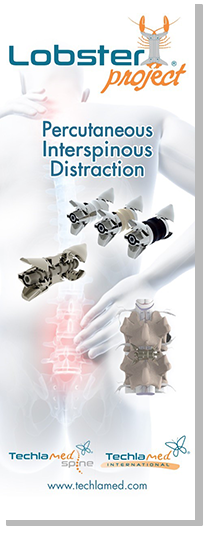Mini invasive solutions for spine surgery
 Techlamed is an Italian company that deals with high technology medical solutions for medical and veterinary use.
Techlamed is an Italian company that deals with high technology medical solutions for medical and veterinary use.
In 2011 Techlamed bought the exclusive rights for the Holmium YAG laser usage, with which two devices has been developed, Sclerolux® (phlebology) e Discolux® (spine surgery).
Moreover, Techlamed developed a dynamic percutaneous stabilization system called Lobster® for the of degenerative lumbar canal stenosis treatment.
In spinal surgery, Techlamed offers mini invasive solutions for:
• Central, lateral and foraminal lumbar spinal stenosis with leg, buttock or groin pain, which can be relieved during flexion (Lobster®)
• Facet syndrome due to facet osteoarthritis (Lobster®)
• Degenerative Disc Disease (DDD) with retrolisthesis (Lobster®)
• Degenerative spondylolisthesis up to grade I with hyperlordotic curve (Lobster®)
• Interspinous pain arising from Baastrup syndrome “kissing spines” (Lobster®)
• Lumbar radiculopathy/Lumbar cruralgia (Discolux®)
• Lumbar discal bulging and lumbar disc herniations (Discolux®)
• Cervical discal bulging and cervical disc hernations (Discolux®)
• Small/medium size disc protrusions with discogenic low back pain (Discolux®)
Lobster® device, percutaneous interspinous process spacer, is indicated for the treatment of degenerative lumbar canal stenosis, which causes chronic or acute back pain that may radiate to the lower limbs with weakness in the legs and loss of balance during walking (neurological claudication).
Lobster® is implanted by percutaneous surgical technique with a dedicated instrument set, under local anesthesia. The percutaneous technique is performed with a small skin incision, for less blood loss and reduced muscle trauma.
Euthermic discolysis with Ho:YAG Discolux® Laser is a technique of laser assisted discetomy that consists of extracting a portion of the intervertebral disc nucleus pulposus, liquefied at very low temperature, in order to reduce the pressure inside the disc with the pathology, without affecting the vitality of the residual fibroblasts. The mini invasive surgical technique is performed in a short time, under local anesthesia, and in total safety. Percutaneously access with a 18G diameter cannula. The average temperature in the disc is less than 45°, and this doesn’t involve the risks of carbonization.
